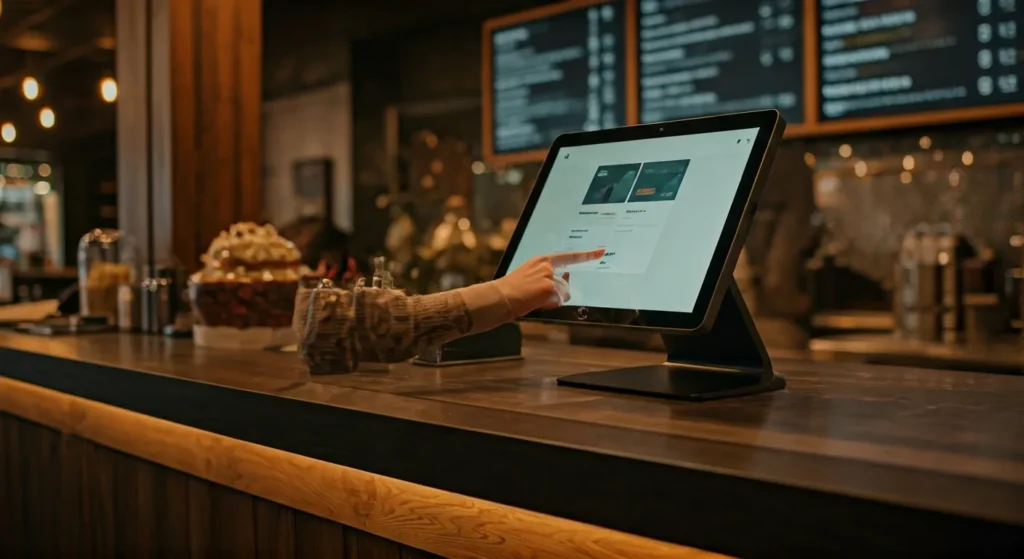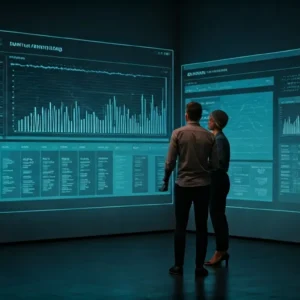
Key Highlights
- The optimal restaurant POS system should facilitate seamless payment processing. This contributes to customer satisfaction by providing various payment options.
- Effective inventory management tools are essential for operating your restaurant efficiently and monitoring the food selections on your menu.
- Robust staff management enables you to reduce labor expenses and enhances teamwork among your staff.
- By utilizing real-time analytics and comprehensive reports, restaurant owners can obtain the necessary information to make informed decisions regarding their business.
- It is crucial for the restaurant POS system to integrate with other applications. This streamlines daily operations and enhances the overall customer experience.
- Emphasizing these POS features will ensure that your restaurant business remains contemporary, operates efficiently, and prioritizes customer satisfaction.
Introduction
In the current market, it is essential for a restaurant to select the appropriate technology. The suitable point of sale, or POS system, facilitates operations for both staff and customers. A contemporary restaurant POS system extends beyond mere payment processing. It can assist with inventory management and incorporate advanced features, such as analytics, enabling restaurant owners to evaluate their business performance.
By leveraging the key functionalities of an effective restaurant POS, owners can enhance their business operations. This also contributes to an improved customer experience and fosters customer loyalty. With an efficient restaurant POS system, it becomes simpler to adapt to market changes. Choosing the right tools will enable any restaurant to thrive and expand over time.
Top 5 Features Every Ideal Restaurant POS System in Australia Should Offer
A contemporary restaurant POS system must excel in several key areas to ensure efficient operations and maintain customer satisfaction. Firstly, seamless payment processing with various payment options is essential. This facilitates a straightforward checkout experience for every customer. Additionally, the restaurant POS system should incorporate effective inventory management. By implementing this, restaurants can minimize food waste and optimize the use of their resources.
An appropriate POS system provides robust employee management tools. This enables restaurant owners to monitor their team’s performance and ensure that all tasks are executed effectively. With real-time reporting and analytics, restaurant owners can track sales and gain insights into customer preferences. These functionalities assist them in identifying the best-selling items and understanding customer likes.
Furthermore, the restaurant POS system should integrate with other applications from different vendors. This enhances team efficiency and allows for improved marketing efforts, increasing visibility among potential customers. With these capabilities, managing inventory, overseeing employees, processing payments, and enhancing customer satisfaction becomes straightforward.
1. Seamless Payment Processing and Multiple Payment Options
A seamless transaction is essential for a restaurant’s success. By offering customers various payment options, such as credit cards, mobile wallets, or QR code payments, you enhance their satisfaction and reduce their waiting time. An effective restaurant POS system with reliable payment processing ensures the security of their transactions. This also results in fewer order mistakes and improved cash flow for the establishment. Furthermore, allowing customers to pay according to their preferences can foster strong loyalty. They are more likely to return, and a restaurant POS can significantly enhance their experience, encouraging repeat visits to your brand.
2. Advanced Inventory Management for Restaurants
Effective inventory management enables a restaurant to maintain optimal stock levels while minimizing waste. An efficient restaurant POS system facilitates real-time tracking of menu items. This capability allows restaurant owners to monitor inventory levels whenever necessary. Utilizing a POS system can reduce order inaccuracies and assist staff in accommodating special customer requests. Additionally, restaurant owners can ensure that popular menu items are readily available to prevent shortages. With advanced functionalities such as automatic reordering and understanding customer preferences, the restaurant POS system can enhance operational efficiency. Robust inventory management combined with these features can result in improved customer satisfaction and a more streamlined daily operation within the restaurant.
3. Robust Employee and Staff Management Tools
An effective POS system is equipped with robust employee and staff management capabilities. These features assist restaurant owners in monitoring team schedules, managing labor expenses, and evaluating employee performance. With functionalities such as real-time attendance monitoring and shift planning, managers are empowered to make informed decisions regarding staffing levels. This enables them to adjust personnel according to customer demand and order volume. Consequently, these practices enhance the efficiency of business operations.
Integrating employee management with other components of restaurant software, including inventory control and customer relationship management, facilitates smoother operations. This integration simplifies tasks for staff members while simultaneously ensuring a positive experience for customers during each visit. A high-quality POS system consolidates these elements to support the restaurant’s daily success.
4. Comprehensive Reporting and Real-Time Analytics
An effective restaurant POS system enables managers to access comprehensive reports and real-time data. This capability assists restaurant owners in understanding the dynamics of their business and making informed decisions. By analyzing customer behavior and operational processes within the restaurant, they can identify significant trends, determine which menu items are most successful, and monitor inventory levels closely.
The reporting features also contribute to managing labor costs and enhancing overall business efficiency. By leveraging this information, the restaurant POS system strengthens marketing strategies and maintains high levels of customer satisfaction. These tools facilitate the management of loyalty programs, making guests feel more valued. Ultimately, all of this contributes to the restaurant’s ability to differentiate itself in a competitive market.
5. Integration Capabilities with Third-Party Apps and Services
An effective restaurant POS system can offer significantly more benefits when it integrates seamlessly with various applications and tools. It should facilitate easy connections to online ordering platforms, kitchen display systems, and customer relationship management services. This integration enhances the overall workflow, enabling the team to accomplish more tasks in a shorter amount of time. When all systems within the restaurant communicate effectively, owners can leverage customer data more efficiently. They can monitor inventory levels, implement targeted marketing strategies, and achieve greater customer engagement. A restaurant POS with robust integration capabilities empowers your business to adapt and expand as necessary. Consequently, all aspects of the restaurant’s operations can function cohesively without any issues.
Key Benefits of Using a Modern Restaurant POS System
Enhancing operational efficiency in a restaurant begins with the implementation of a contemporary POS system. Such a system facilitates smoother payment processing and significantly aids in customer relationship management. This results in improved customer experiences, encouraging patrons to return and feel more satisfied with their purchases.
The inventory management capabilities of a POS system also assist restaurant owners in maintaining optimal stock levels. This leads to reduced food waste and other resource wastage, while simultaneously lowering labor costs. Restaurant owners can leverage real-time analytics to monitor operations and make informed decisions for their business.
The system’s compatibility with mobile devices allows staff members to communicate effortlessly with one another and with the kitchen team. With these advantages, a restaurant can enhance customer engagement and foster business growth and improvement year after year.
Increased Operational Efficiency and Speed
To successfully operate a restaurant, it is essential to work efficiently and swiftly. A contemporary POS system can facilitate this process. It accelerates order processing and reduces wait times. Consequently, staff members are afforded more opportunities for customer interaction. Real-time analytics and rapid service functionalities enable restaurant owners to monitor inventory levels and modify menu items as necessary. Additionally, automated tools prevent manual errors, ensuring accurate order management. Thanks to the user-friendly interface, staff can quickly access customer information and address special requests. All of this contributes to enhancing team performance and providing patrons with an improved dining experience.
Enhanced Customer Experience and Loyalty
Providing an exceptional experience for your customers is crucial for maintaining their loyalty to your restaurant. Utilizing a robust restaurant POS system ensures operations run efficiently, facilitates quicker order processing, and reduces wait times. With a POS system, you can also swiftly modify the menu, allowing you to promptly cater to varying customer preferences.
When your restaurant’s POS includes integrated loyalty programs, it enables you to engage with customers on a more personal level. This can encourage them to return repeatedly. Simultaneously, restaurant owners can leverage customer data from the POS system to understand preferences, visit patterns, and ordering habits. This information aids in creating better promotions and providing offerings that truly resonate with your customers.
By employing the right combination of tools, you ensure that customers feel appreciated each time they enter your establishment. This fosters trust, encourages repeat visits, and enhances loyalty to your brand.
Improved Accuracy and Order Management
An effective POS system enhances the accuracy of order management by reducing human errors. It includes features such as kitchen display systems and straightforward order tracking, which allow kitchen staff to clearly view menu items and any special requests. Consequently, the frequency of order mistakes is diminished. This streamlined process not only improves operational efficiency but also boosts customer satisfaction, as patrons receive their orders as requested and on time. With improved order management through your POS system, customer experiences are enhanced, leading to a higher likelihood of repeat visits. Such loyalty is essential for the success of your restaurant business.
Essential Security Features for Restaurant POS Systems
A robust restaurant POS system prioritizes security. It is designed to safeguard customer information and ensure that every transaction is secure. The system employs data encryption, which is instrumental in protecting payment information during processing. Another critical aspect is the implementation of access controls. This feature allows restaurant owners to determine which employees can view or perform specific actions within the POS system. Consequently, only trusted personnel are granted access to essential functions. Ensuring that the POS system complies with Australian data regulations further enhances safety and fosters trust.
These vital features contribute to the security and efficient operation of the restaurant business. They also cultivate customer trust and satisfaction. By taking appropriate measures, the POS system not only protects the business but also upholds the reputation of restaurant owners.
Data Encryption and Secure Payment Processing
Ensuring the security of customer data is crucial in the restaurant industry. Implementing advanced data encryption alongside a reliable POS system guarantees that payment information remains secure during transmission. This approach safeguards the data from potential threats and ensures secure payment processing.
When payment processing is both secure and robust, customers tend to have greater trust in the restaurant. Additionally, it enhances the overall customer experience. Restaurant owners can be confident that their POS system safeguards customer loyalty by protecting their data.
Effective security measures empower restaurant owners to conduct each transaction with assurance. In the current digital landscape, such security transforms a reliable POS system into a secure repository for all financial information, benefiting everyone involved.
User Access Controls and Permissions
Establishing well-defined user access controls and permissions is essential for safeguarding critical data within a restaurant POS system. When restaurant proprietors define roles and access levels, they can prevent staff members from accessing private customer information or financial data. This approach reduces the likelihood of unauthorized actions by individuals. By delineating these roles, accountability within the restaurant industry is enhanced. Staff can focus on their specific responsibilities, such as order management or inventory oversight. As a result, the restaurant POS system operates more efficiently, and the overall security of the restaurant business is improved.
Compliance with Australian Data Protection Standards
Ensuring that your restaurant’s POS system adheres to Australian Data Protection Standards is crucial. An effective POS system should implement robust data encryption to safeguard customer information. This practice fosters trust and encourages repeat patronage. Additionally, your system must incorporate user access controls. Only personnel who require access to sensitive data should be permitted to view it. Compliance with these standards significantly reduces the risk of data breaches. Furthermore, it can enhance customer satisfaction. By adopting these security measures, restaurant owners can manage customer relationships with confidence. They also maintain the integrity and safety of their business operations through a reliable POS system.
How to Choose the Right Restaurant POS System in Australia
Selecting the appropriate restaurant POS system requires consideration of several key factors. Initially, assess the cost of the POS system. Subsequently, evaluate whether the benefits it provides justify the expense. Ensure that the restaurant POS software aligns with your business objectives.
Furthermore, prioritize customer support and training. Effective assistance facilitates your staff’s ability to utilize the system. This preparation enables your team to confidently engage with the restaurant POS on a daily basis.
Additionally, consider the system’s adaptability as your restaurant expands. Customizable features and add-ons can be advantageous. Your restaurant POS system should seamlessly integrate with your business operations as they evolve and develop.
Evaluating Cost and Return on Investment
A restaurant manager must consider both the initial cost and the potential returns when selecting a POS system. Evaluate how the upfront expenses align with the features offered, including payment processing, inventory management, and staff oversight. An effective POS system should facilitate daily operations, reduce labor expenses, and enhance customer satisfaction. Additionally, it is important to contemplate the long-term benefits, such as increased sales from loyalty initiatives and the development of stronger customer relationships. By properly configuring the system, a quality POS can provide greater value, contributing to improved service and smoother operations within your restaurant.
Assessing Customer Support and Training
Effective customer support can significantly influence the operational efficiency of a restaurant. An appropriate POS system should provide assistance through various channels, including phone, chat, or email. These options ensure that any issues are resolved promptly.
Furthermore, employees require comprehensive training to utilize the POS software effectively. This training may take the form of online webinars or in-person sessions at the restaurant. When staff are proficient in using the system, the incidence of order errors decreases. It also enhances their confidence while performing their duties. With improved training, customer satisfaction increases, leading to smoother operations within the restaurant.
Reviewing Customisation and Scalability Options
Selecting a restaurant POS system is a significant choice for any dining establishment. It is essential to have a system that allows for modifications to meet your specific requirements. This entails the ability to update menu items and pricing as necessary. An ideal POS system should facilitate prompt service adjustments without complications.
An effective POS system should also integrate seamlessly with other applications, such as loyalty programs. This integration will assist in ensuring customer satisfaction and encouraging repeat visits. It is crucial for a restaurant POS system to be scalable alongside your business growth. As your customer base expands or you launch additional locations, the system must efficiently manage increased demands. With the appropriate restaurant POS, you can ensure your establishment operates efficiently while providing your patrons with exceptional service consistently.
Conclusion
Selecting an appropriate POS system is crucial for a restaurant. It enhances efficiency and improves the customer experience. An effective POS system will assist with tasks such as inventory management, streamlined payment processing, and staff oversight. With the right POS system in place, the operational efficiency of your business can significantly improve.
Additionally, there are customer loyalty programs that can be integrated with your POS. These programs facilitate stronger connections with your customers, encouraging repeat visits. Furthermore, the system can provide real-time insights into operational performance. This enables you to identify successful areas and those requiring adjustments, ensuring customer satisfaction.
The restaurant industry is in a constant state of evolution. To remain competitive and address the needs of both staff and customers, it is advisable to adopt innovative technologies that foster business growth.
Frequently Asked Questions
What are the most important features to look for in a restaurant POS system?
When selecting a restaurant POS system, it is essential to consider specific features. It should facilitate straightforward payment processing. Effective inventory management is equally crucial. The system must provide robust tools for your staff. Additionally, it should offer clear reporting and the capability to integrate with other systems. These elements enhance the functionality of the restaurant POS. They also elevate the customer experience. With an appropriate POS system, your establishment can operate more efficiently and fulfill the requirements of your business.
Is it necessary for a POS system to integrate with accounting and delivery apps?
Integrating a point of sale system with your accounting and delivery applications is crucial. This integration ensures accurate financial record-keeping, facilitates smoother operations within the restaurant, and enhances customer satisfaction. By streamlining order management, patrons receive improved service. Failing to establish these connections may lead to complications for your restaurant. You could struggle to maintain accurate financial tracking, and you may also encounter difficulties in delivering food to customers promptly.
How does a POS system help with compliance in Australia?
A point of sale system assists you in adhering to regulations in Australia. It ensures that each transaction is secure by employing unique codes that protect your information. Additionally, it maintains accurate records, which are essential for your tax obligations. Furthermore, it allows you to manage access to the system. With these measures implemented, restaurants can comply with Australian data protection legislation. This also reduces the likelihood of fraud and data breaches.
Can a POS system improve customer loyalty and repeat business?
Indeed, a contemporary POS system fosters customer loyalty. It facilitates swift and effortless transactions. Additionally, this system enhances the shopping experience with a more personalized approach. Features such as loyalty programs and order history tracking enable you to engage with your customers effectively. This encourages them to return, which is beneficial for sustaining long-term relationships. When you implement these tools, your patrons are more inclined to come back.














